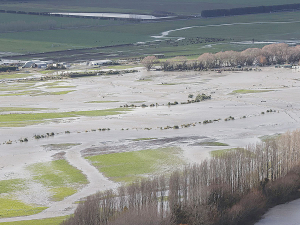HortNZ celebrates 20 Years
More than 150 people turned up at Parliament recently to celebrate the 20th anniversary of Horticulture New Zealand (HortNZ).
 Eligibility criteria for funding from the Canterbury Flood Recovery Fund are a barrier to some farmers receiving funding, says MP for Selwyn Nicola Grigg. Photo Credit: ECan Media Team
Eligibility criteria for funding from the Canterbury Flood Recovery Fund are a barrier to some farmers receiving funding, says MP for Selwyn Nicola Grigg. Photo Credit: ECan Media Team
Nearly four months on from the floods that devastated much of rural Canterbury, the Government has fallen short of the promises it made to local farmers, says National MP Nicola Grigg.
“Jacinda Ardern and Damien O’Connor flew into Ashburton with cameras rolling to announce a $4 million Canterbury Flood Recovery Fund – indicating that it was just a start, that they were still working to establish the full scale and cost of the damage – and that there would be more where that came from,” says Grigg who is MP for Selwyn.
She says the fund offers grants of up to 50% of eligible costs with a total limit of $250,000 and will contribute to uninsurable costs to enable productive land to return to a productive state as quickly as possible.
“Essentially, it can only be used for the clearing up of flood debris such as boulders, gravel, trees, and silt on productive land. Insurable costs, such as replacing fences, have not been targeted by the fund.”
“Four months on and the Ministry for Primary Industries (MPI) has received 168 applications for support, with a total monetary value of $8,029,535.
“To put the number of applications into perspective there are over 550 properties in the ArcGIS survey database, suffering varying degrees of damage.
Grigg says that the criteria set for the fund requires 51% of income to be from the primary industries, meaning lifestyle blocks listed in the database were ineligible.
She claims that some listed in the database as sheep or beef farms have other income streams, including tourism and rental properties which exclude them from applying because they don’t meet the 51% threshold.
“In my view, that absolutely stinks. The Government set a criteria that was very difficult for highly-stressed, overworked and exhausted farmers to meet,” she says.
She says that while MPI has accepted 82 applications, they’re only paying $1,428,964 to those farmers and have declined a further 38 applications on the ground they don’t meet the eligibility criteria.
“And therein lies the problem – the eligibility criteria is far too strict and, therefore, discounts hundreds of affected farmers and landowners. The monetary value of the applications alone indicates the Government is way off target.”
Grigg says that O’Connor needs to instruct MPI to loosen its eligibility criteria and get the money to the farmers most in need.
Registrations are now open for the 2026 Ruralco Golf Classic, with all proceeds from the event set to support the Mid Canterbury Rural Support Trust.
Mating wrapped up last month at the across-breed Beef Progeny Test on Pāmu’s Kepler Farm in Manapouri.
Libby Judson is a keeper of memories from an age gone by. Tim Fulton tells her story.
A New Zealand-first native tree study has highlighted the Bioeconomy Science Institute's position as a forestry research leader.
Hemp fibre processor Rubisco is relocating its core processing facility to Ashburton as part of a $20-$30 million expansion to leverage what it says is an accelerating global demand for sustainable and renewable fibres.
Tradition meets some of the latest in technology at the 2026 East Coast Farming Expo.